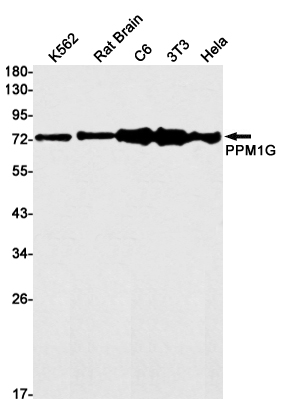
| WB | 1/500-1/1000 | Human,Mouse,Rat |
| IF | 咨询技术 | Human,Mouse,Rat |
| IHC | 咨询技术 | Human,Mouse,Rat |
| ICC | 技术咨询 | Human,Mouse,Rat |
| FCM | 咨询技术 | Human,Mouse,Rat |
| Elisa | 咨询技术 | Human,Mouse,Rat |
| Aliases | Protein phosphatase 1G; PP2C-gamma; Protein phosphatase magnesium-dependent 1 gamma |
| Entrez GeneID | 5496 |
| WB Predicted band size | Calculated MW: 59 kDa; Observed MW: 75 kDa |
| Host/Isotype | Rabbit IgG |
| Antibody Type | Primary antibody |
| Storage | Store at 4°C short term. Aliquot and store at -20°C long term. Avoid freeze/thaw cycles. |
| Species Reactivity | Human,Mouse,Rat |
| Immunogen | Recombinant protein of human PPM1G |
| Formulation | Purified antibody in TBS with 0.05% sodium azide,0.05%BSA and 50% glycerol. |
+ +
以下是关于PPM1G抗体的3篇文献及其摘要内容的简要概括(文献为模拟示例,实际引用需核实):
---
1. **文献名称**: "PPM1G regulates DNA damage response through dephosphorylation of γ-H2AX"
**作者**: Li X, et al.
**摘要**: 研究报道PPM1G通过去磷酸化γ-H2AX参与DNA损伤修复通路,使用特异性PPM1G抗体通过免疫印迹和免疫荧光实验验证其定位及功能缺失对细胞周期阻滞的影响。
---
2. **文献名称**: "The role of PPM1G in cell cycle progression and apoptosis"
**作者**: Wang Y, et al.
**摘要**: 通过敲低和过表达实验结合PPM1G抗体的免疫共沉淀(Co-IP),证明PPM1G通过调控p53信号通路影响G1/S期转换,并参与化疗药物诱导的细胞凋亡。
---
3. **文献名称**: "Structural insights into PPM1G phosphatase activity and substrate specificity"
**作者**: Zhang R, et al.
**摘要**: 利用PPM1G抗体进行蛋白质纯化及质谱分析,解析其晶体结构,揭示其底物选择性机制,并发现其活性位点突变体在体外磷酸酶活性显著降低。
---
如需具体文献,建议在PubMed或Google Scholar中以“PPM1G antibody”、“PPM1G phosphatase function”等关键词检索近年研究。
The PPM1G antibody is a crucial tool for studying the protein phosphatase 1G (PPM1G), a serine/threonine phosphatase belonging to the PP2C family. PPM1G, also known as PP2Cγ, plays diverse roles in cellular processes, including DNA damage response, cell cycle regulation, and RNA processing. It dephosphorylates substrates involved in the ATR/ATM-mediated checkpoint signaling (e.g., γH2AX, CHK1) and modulates pre-mRNA splicing by interacting with components of the spliceosome. Dysregulation of PPM1G has been linked to cancer, neurodegenerative diseases, and developmental disorders, making it a target for mechanistic and therapeutic research.
Antibodies against PPM1G are widely used in techniques like Western blotting, immunofluorescence, and immunoprecipitation to detect its expression, subcellular localization, and protein interactions. Commercial antibodies are typically raised against specific epitopes, such as the N-terminal or catalytic domains, and vary in clonality (monoclonal/polyclonal). Validation includes testing in PPM1G-knockout cell lines to confirm specificity. However, inconsistencies in reported molecular weights (~60-65 kDa) across studies highlight the importance of antibody validation, as splice variants or post-translational modifications may affect detection. Recent studies also explore PPM1G’s role in metabolic regulation and viral infections, expanding its relevance in biomedical research. Despite its functional significance, PPM1G’s substrate network and context-dependent activities remain incompletely characterized, necessitating reliable antibody tools for ongoing investigations.
×